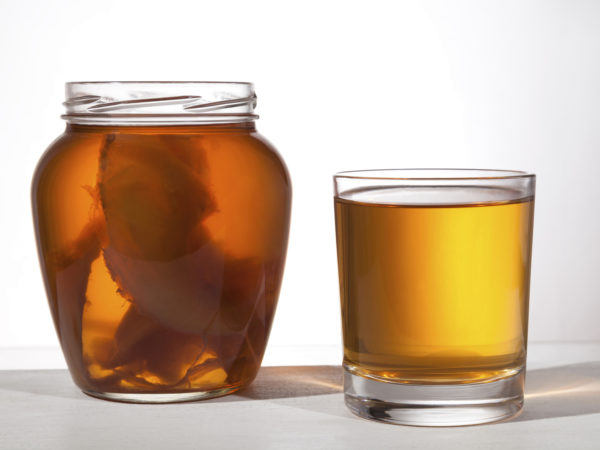Cured By Kombucha?
What are the benefits, if any, of Kombucha tea? Do you recommend it.
Andrew Weil, M.D. | June 20, 2018

Kombucha is a fermented drink, supposedly first made in ancient China. It is made by the activity of a mixed culture of bacteria and yeast on sweetened black or green tea. You can make it at home, using a starter culture. commercial producers allow the brew to ferment for one to three weeks and then bottle it to develop carbonation.
While it is sometimes referred to as a mushroom tea, kombucha isn’t a mushroom and the tea doesn’t contain mushrooms. But as the bacteria and yeast grow, they result in a jelly-like blob – called a “Scoby” – on the surface of the liquid. “Scoby” stands for “Symbiotic colony of bacteria and yeast.” The finished product contains high levels of caffeine, sugar and B vitamins. The sugar and caffeine may be responsible for the energy some consumers claim they feel when they drink kombucha, which also contains probiotics – good gut bacteria – if the product has not been pasteurized.
Kombucha tastes something like fizzy cider and has become increasingly popular in the U.S., reportedly growing in sales by 25 percent per year. It is now the fastest growing segment of the “functional beverage” market, comprising drinks with purported health benefits.
Kombucha has been recommended and used informally as a treatment for a wide variety of health problems ranging from high blood pressure and weakened immunity to cancer, diabetes, and AIDS. However, we have no human studies to show that it is helpful for these or any other health problems. Animal studies have shown that kombucha has some antioxidant and immune stimulating activity, but here, too, no scientific evidence documents these effects in humans.
If you make your own kombucha, be aware that there is a small but real risk of contamination with aspergillus, a toxin-producing fungus that can be harmful to people with compromised immune systems, including those with AIDS and cancer patients undergoing chemotherapy. Be sure to research the brewing process thoroughly and proceed under sanitary conditions. Persons with weakened immunity as well as pregnant women and children should probably drink only pasteurized kombucha.
Adverse reactions to kombucha reported in the medical literature include nausea, vomiting and headache. Other rare side effects are allergic reactions, jaundice, head and neck pain, impaired liver function, and muscle inflammation. Finally, lead poisoning has been linked to use of kombucha brewed in lead-glazed ceramic pots.
Bottom line: despite all the hype about the beneficial health effects of kombucha, there is no scientific evidence for these benefits in humans. I do not recommend kombucha, but if you like it, drink it.
Andrew Weil, M.D.
Source:
Rasu Jayabalan et al, “A Review on Kombucha Tea—Microbiology, Composition, Fermentation, Beneficial Effects, Toxicity, and Tea Fungus.” Food Science and Food Safety, June 21, 2014, doi.org/10.1111/1541-4337.12073











